Daily Writing
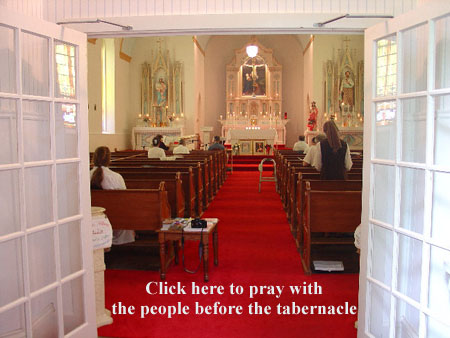
| Shepherds of Christ Daily Writing |
 |
May 7, 2010
|
May 8th Holy
Spirit Novena |
The Novena Rosary
Mysteries |
May 7, 2010
at 6:20pm with Rita
Please tune in and
pray with us!
China, Indiana Retreat
May 10 - May 13th
93rd Anniversary of Our Lady's
first apparition at Fatima.
Please come or tune in
and pray with us.
The Lord gave an urgent message to print
Tell My People on April 10th.

Can you please help us?
1-888-211-3041
May 7, 2010
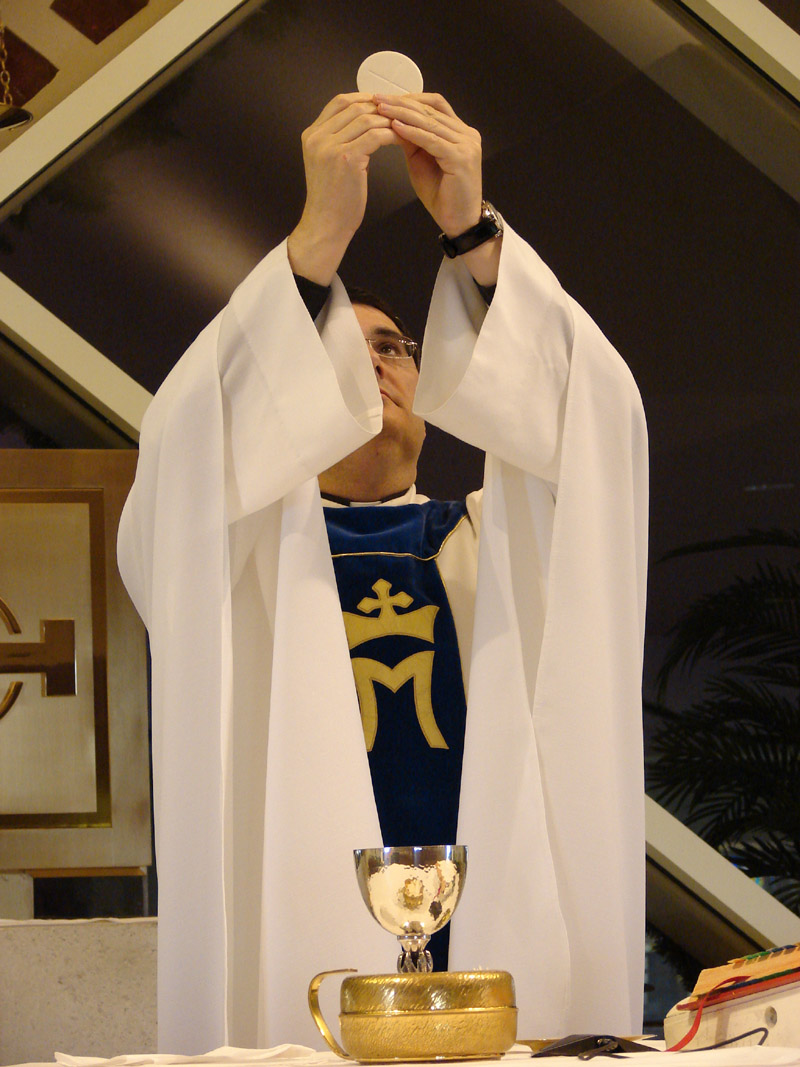
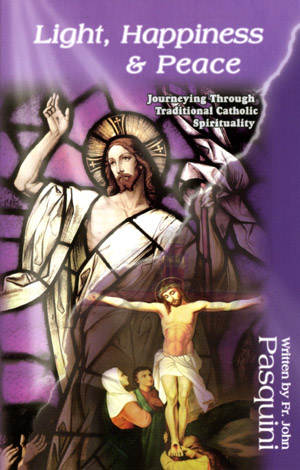
Accompanying Prayer
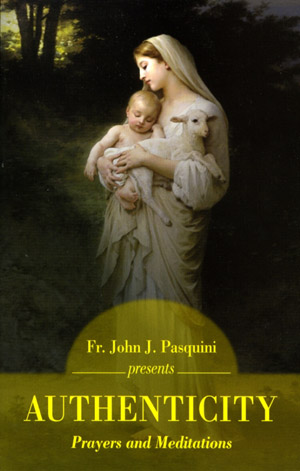

Chapter 6
The Illuminative Stage
A Time of Enlightenment
Again Jesus spoke to them, saying, “I am the light of the world; he who follows me will not walk in darkness, but will have the light of life” (Jn 8:12).
In the purgative stage we grow to love God with our whole heart primarily by means of the faculties of the senses. In the illuminative stage we begin to love God not only with our whole heart, but also with our whole soul. This love transcends the limits of the senses. In the final stage, the unitive stage of the spiritual journey, love becomes complete. At this stage we love God with our whole heart, soul, strength, and mind.
In the illuminative stage, the ease of prayer returns after the darkness. A greater capacity for work, service, teaching, directing, and organizing takes place at this stage. The illuminative stage is exemplified by “good works.” It is the beginning of the mystical life. It is the time when everyday mysticism is experienced. As Karl Rahner states, it is a stage in life
-
where we dare to pray into silent darkness and know that we are heard, although no answer seems to come back about which we might argue and rationalize,-
where we let ourselves go unconditionally and experience this capitulation as true victory,-
where falling becomes true uprightness, - where desperation is accepted and is still secretly accepted as trustworthy without cheap trust,-
where we entrust all our knowledge and all our questions to the silent and all-inclusive mystery which is loved more than all our individual knowledge which makes us such small people,-
where we rehearse our death in everyday life and try to live in such a way as we would like to die, peaceful and composed….164This is the mystical walk with and in God. This is the “mysticism of everyday life.”
In the illuminative stage, the acquired virtues that were primarily predominant in the purgative stage are now brought to the service of the infused virtues. The acquired virtues and the infused virtues, therefore, work hand in hand for the good of the person’s growth in the life of God.
165The virtues come together as never before in the illuminative stage. The acquired virtue of prudence and the infused virtue of prudence work hand and hand and are aided by the Spirit’s gift of counsel. The fruits of this interaction are foresight, circumspection, and constancy. The acquired virtue of fortitude and the infused virtue of fortitude work hand and hand and are aided by the Spirit’s gift of fortitude. The fruits of this interaction are patience, magnanimity, and longanimity. The acquired virtue of justice and the infused virtue of justice work hand and hand and are aided by
the Spirit’s gift of piety. The fruits of this interaction are obedience and a call for penance and religion. The acquired virtue of temperance and the infused virtue of temperance work hand and hand and are aided by the Spirit’s gift of fear. The fruits of this interaction are chastity, meekness, and poverty.166Acquired Prudence (cf. Pr 14:15; 1 P 4:7)
167 St. Maximus ConfessorThe mind that has succeeded in the active life advances in prudence….
Acquired prudence is the moral virtue that directs through right reason acts of justice, courage, temperance, and their related virtues. It preserves us from impulsiveness in temperament, imagination, and sensible appetites. It moves us to seek advice, obey what is reasonable, and gives the strength to deal with differences in the temperament of different characters. At this stage of the spiritual journey, the acquired virtue of prudence is well developed and prepares us for the powerful response to the infused gift of prudence, the moral virtue that is grace-elevated.
168Infused Prudence
Infused prudence is the moral virtue that transcends the limits of the natural gift of right reason. It is in a sense the consequence of taking an acquired moral virtue and infusing it with grace. Grace elevates that which was natural into the realm of that which is supernatural. The infused moral virtue of prudence is given in response to grace. It is marked by a profound love
and zeal for God and for the burning desire for the salvation and good of all people. It directs all the virtues to that which can be considered their last end, which is God’s eternal destiny for all. All acts are judged according to a pilgrim’s eternal destiny. The focus is on eternity, and not simply on the temporal aspects of life, which the acquired virtues tend to be primarily focused on.169The gift of counsel accompanies the infused moral virtue of prudence. Wise decisions are made which are based on the knowledge of self and God. This leads to mercy, the beatitude of mercy, for a person with the infused moral virtue of prudence is able to strike a comfortable balance between rigor and justice. It also leads to the preferential option for mercy.
170Foresight, circumspection, and constancy are the quintessential marks of a person with prudence in the illuminative stage of the spiritual journey. They are blessed with an elevated sense of foresight and circumspection; that is, that grace-empowered ability to consider all circumstances and their possible consequences, particularly as they pertain to one’s eternal destiny. They are also blessed with the gift of constancy, that ability to remain — as a consequence of the insights brought about through foresight and circumspection — steadfast in faith in whatever life may bring.
171Prudence and Simplicity
Prudence moves us to live life simply. Prudence enables us to do the littlest things in the holiest manner.
172 St. Thérèse of Lisieux’s little way exemplifies this reality.Acquired and Infused Fortitude
The acquired moral virtue of courage or fortitude is elevated by grace into the realm of infused courage or fortitude. Aided by the Spirit’s gift of fortitude, the moral virtue of fortitude raises us to new heights in the spiritual life, to new heights in patience, magnanimity, and longanimity or forbearance. Those experiencing the grace of fortitude are those whose patience in times of difficulty does not allow them to depart from right reason illumined by faith. They have the patience and forbearance to endure and fight off any temptations that might cause them to yield to difficulties. At this stage we are able to bear, often beyond the natural abilities of the body, adversity, sadness, and injuries of all sorts for whatever length of time.
We are able to see and bear the cross. This seeing and bearing of the cross is done with magnanimity, with a sense of calm and sacrifice. The end of the difficulty is seen, the victory of the cross is clearly perceived by us. Because of this reality, we experience a loftiness of spirit enabling us to disdain any hint of meanness or revenge as a consequence of the adversity encountered.
173Acquired and Infused Justice
Justice is a movement away from self-infatuation and a movement toward the good of others (cf. Lv 19:15; Col 4:1). Again, as with all the moral virtues, the acquired moral virtue of justice is at the service of the infused, grace-filled, moral virtue of justice. Aided by the Spirit’s gift of piety, we exemplify a life of authentic faith and works.
174When discussing the moral virtue of justice, we must take
into account the three expressions of justice that a person at this stage of the spiritual journey is radically aware of.1) Commutative Justice: Commutative justice is aimed at the dignity of equality. Because of this reality, it is a form of justice that fights against any occurrences of theft, fraud, usury, false accusations, insults, unjust blame, defamation, slander, gossip, insinuation, and so on.
1752)
Distributive Justice: Distributive justice is aimed at how public goods are used. It fights against any hint of favoritism, oppression, unrelieved poverty, and corruption of all kinds.1763)
Social Justice: Social justice or legal justice is preoccupied with the common good of society. It demands personal sacrifice,177 and is inseparable from prayer:178 Thomas MertonAction and contemplation now grow together into one life and one unity. They become two aspects of the same thing. Action is charity looking outward to other men, and contemplation is charity drawn inward to its own divine source. Action is the stream, and contemplation is the spring. The spring remains more important than the stream, for the only thing that really matters is for love to spring up inexhaustibly from the infinite abyss of Christ and of God.
Guiding all three of these expressions of justice is the gift of epikeia, the gift that preserves the dignity of the human person at all cost, the gift that recognizes the spirit as well as the letter of the law.
179Justice and Veracity
Justice and veracity are intertwined with prudence and simplicity. Justice and veracity however are predominantly concerned with moral integrity, with telling the truth and acting according to it. In the illuminative stage sins of duplicity, hypocrisy, boasting, and mockery are extinguished.
180 There are no two-faced saints!Acquired and Infused Temperance
Temperance elevated by grace to what is referred to as infused temperance — and aided by the Spirit’s gift of fear — is the moral virtue that is exemplified by a sense of moderation in thought, action and feeling (cf. Si 5:2; 18:30; 37:27-31; Tt 2:12). Temperance finds its most precious expression in the evangelical counsels
181 of poverty, chastity, and obedience. Meekness (that ability to endure persecutions or injustices with patience and without resentment) is also a significant expression at this stage of the spiritual journey.The Evangelical Counsels
Poverty is the gift that purifies us of all attachments. It is the gift that unites us to Christ Jesus. For St. Thomas Aquinas, Christ chose a life of poverty for four reasons, four reasons that all disciples are all called to imitate.
1821) Poverty frees us from the cares that are associated with earthly goods.
2) Poverty frees us to be concerned with the salvation of souls.
3) Poverty frees us for the desire of eternal goods.
4) Poverty frees us, in the absence and contradiction of earthly helps, to express the divine power that saves souls.
Poverty
is true freedom. It moves the clouds of worldly attachments away from the spiritual life and detaches us from all that is not for the glory and honor of God. Love of God, love of neighbor and love of heaven are the all-consuming hungers of the poor in spirit.183Chastity
of heart and body are exemplified in the infused moral virtue of temperance. Whether one is a virgin, a religious, or a single, unmarried person, all are called to a chaste life, a life free of lewdness or salaciousness, a life which is pure in thought and action. It is empowered by the grace that accompanies the love of neighbor and the love of God.184Obedience
is a joyful submissiveness to that which is best for our eternal salvation. Obedience delivers us from the slavery that is attached to self-will and self-infatuation. The fruits of obedience, thus, are rectitude, or righteousness in judgment, which is accompanied by a liberty of spirit: “Now the Lord is the Spirit, and where the Spirit of the Lord is, there is freedom” (2 Cor 3:17).Theological Virtues of Faith Hope and Love
Faith
Faith is a gift (Eph 2:8) aided by the gift of understanding which is in conformity with reason, yet transcends the limits of reason.
185 Faith in the illuminative stage is freed to a great extent of all aspects of egoism, passions, jealousies, whims, etc., of all that can damage our response to the inner call of grace. For some at this stage, faith is greater in the faculty of the intellect, thereby producing the fruits of certitude and firmness in actions. In others, faith is greater in the will, thereby producing the fruits of devotion and confidence.186 In either case, all aspects of life are being guided by the light of faith, which guides the individual to his or her eternal destiny of loving God for being God (Rm 8:28).Hope
Hope is confidence in the help of God. Hope helps us to persevere (Mt 10:22) and overcome trials and tribulations (Rm 5:2-5). Hope, because of these trials and tribulations, purifies us for the love of God (Cf. Ws 3:4-6). Hope is a walk into the mystery of the unknown. Yet it is a walk with a certain sense of certitude of direction. Hope makes us advance always more generously toward God by giving us a greater desire for him. God becomes our end; God becomes all that is hoped for.
In the illuminative stage two lingering defects from the purgative stage are being polished off:
presumption and discouragement. Presumption is the defect that fails to recognize the necessity of responding to grace in the spiritual journey. It is the defect that overemphasizes God’s mercy, and underemphasizes God’s justice. Hence, people often feel they can be pardoned without repentance or in the worst case they can even feel assured of salvation no matter what they do. In the case of the defect of discouragement at this stage, we can often feel that the spiritual journey is too difficult and thus hopeless. We may turn away from grace and go back to our former way of life because we sense that grace is too inaccessible. In the illuminative stage these two hideous defects against hope, against properly ordered confidence in God, are being completely finished off, completely extinguished.Love
For John Climacus, “Love, by its nature, is a resemblance to God.”
187 Love is the conformity of our will to God’s, for all the other virtues follow the virtue of love (cf. 1 Cor 13:4). In the illuminative stage, certain signs can be seen according to St. Thomas Aquinas:1881) Mortal sins are a thing of the past, since love has conquered that inclination.
2) Because of love, earthly things such as pleasures, honors, wealth, etc., are no longer of great interest.
3) Because of love, we seek to be engulfed in the presence of God, to love him, to think of him, to adore him, to pray to him, to thank him, to ask his pardon, to aspire to him.
4) We desire, out of the grace of love, to please God more than anything and anyone in the entire created realm of reality.
5) We seek to love and know God in our neighbor, in spite of the neighbor’s defects. We love our neighbor for simply being a child of God, a child of God who is beloved by God. In the illuminative stage we love God in our neighbor and our neighbor in God. Love of God and love of neighbor merge into one reality. In the words of Dorothy Day, “We cannot love God unless we love each other, and to love we must know each other.”
189Love of neighbor is the most distinguishing characteristic of the illuminative stage (Cf. Mt 5:44, 47, 48).
Zeal
Dearest Lord, teach me to be generous. Teach me to serve You as You deserve; to give and not to count the cost; to fight and not to heed the wounds; to toil and not to seek for rest; to labor and not to ask for reward, save that of knowing that I am doing Your will. Amen. St. Ignatius of Loyola
The illuminative stage of the spiritual journey is marked with tremendous zeal. It is a holy zeal that is directed toward the glory and honor of God and in particular the salvation of all people. Unlike the zeal that is predominant in the purgative stage, this zeal is not lost during times of trials and tribulations, nor is it susceptible to bitterness.
Motives for Zeal
Zeal is nourished by a deep grace-filled thirst to love God and neighbor above all. It is signified by the following marks:
1) An intense desire to imitate Christ in all things.
2) An intense desire to bring all people into the kingdom of God.
3) An intense desire to overcome the enemies of the Church.
4) An intense desire to overcome indifference, inertia, lack of comprehension, ill will, and spiteful opposition.Qualities of Holy Zeal
Holy zeal is enlightened by the light of faith. It is the fruit of the acquired and infused moral virtues, particularly the virtue of prudence and the gifts of the Holy Spirit, particularly the gifts of wisdom and counsel. Unlike bitter zeal, which is not of God, and which is self-seeking, proud, insensitive, impatient, rude and hate-filled, holy zeal, which is of God, is calm, humble, meek, patient, sensitive, and always other-centered. This type of zeal is expressed in the traditional spiritual and corporal works of mercy:
Corporal Works of Mercy
.
Feeding the hungry
.Giving drink to the thirsty
.Clothing the naked
.Sheltering the homeless
.Visiting the sick
.Visiting the imprisonedSpiritual Works of Mercy
.
Instructing the ignorant
.Correcting sinners
.Advising the doubtful
.Showing patience to sinners and those in error
.Forgiving others
.Confronting the afflicted
.Praying for the living and the deadIn her fight against the injustices of the world, Dorothy Day could say with great ease: “It is natural for me to stand my ground…using…weapons as the works of mercy to show love and alleviate suffering.”
190The Holy Spirit in the Illuminative Stage
Wisdom, the highest of the gifts of the Spirit, at this stage of the spiritual life is very active in directing all the other gifts in the grace-filled, zeal-driven, saint of God.
191Fear
The gift of fear supplies strength for the imperfections found in the virtues of temperance and chastity. In the purgative stage, the gift of fear tends to be one that is more servile in nature; that is, a person grows in the spiritual life out of a fear of eternal damnation. In the illuminative stage, the gift of fear is transformed into what has been traditionally called filial fear; that is, a fear that empowers the spiritual life not so much out of a fear of hell as much as a fear of not loving enough. For the people at this stage, the big fear consists in having to face Jesus after their earthly journey without having loved enough.
Love for the poor becomes very powerful at this stage, and thus the gift of fear in the illuminative stage is tied to the beatitude of the love for the poor.
192 St. Vincent de Paul would say: “it is better to feed the poor than to raise the dead.”Piety
The gift of piety is the gift of rendering to God what is rightly due to God. Human reason becomes illumined by faith at this stage as never before. Suffering takes on meaning and a sense of sweetness.
193 As John Henry Newman explains, “I am, I can never be thrown away. If I am in sickness, my sickness may serve Him; in perplexity, my perplexity may serve Him; if I am in sorrow, my sorrow may serve Him.”194 At this stage we find in the mystery of suffering the mystery of love, and we find in the mystery of love the mystery of suffering.Prayer becomes more fervent and persistent as new insights into the mystery of life become illumined. Any hint of hardness of heart is replaced with an open heart. This predisposes us to being open to interior silence, recollection, and detachment. The gift of piety corresponds, as a consequence, to the beatitude that emphasizes the power and preciousness of the meek.
195Knowledge
The gift of knowledge is a gift that elevates human knowledge to new heights. At this stage there is a radical knowledge of those things that are of God and those things that are not of God. The knowledge of good and evil is powerfully perceived and felt at this stage. In the illuminative stage, the gift of knowledge is powerfully tied to the beatitude of the sorrowful.
196Fortitude
In the illuminative stage there is a heightened desire to fight the temptations of the flesh, the world, and the devil. There is also a heightened degree of patience and perseverance in the quest for justice. This stage is often associated with the beatitude regarding those who hunger and thirst for justice.
197Counsel
This gift supplies for the imperfections that hinder the virtue of prudence. It corresponds to the beatitude of the merciful, in that all actions are decided in favor of authentic mercy, a mercy that is properly balanced with justice. The gift of counsel at this stage also helps avoid the dangers of temerity, of recklessness and rashness, which often lead to unhealthy and even evil fanaticism. On the other hand, the gift of counsel helps to fight the danger of pusillanimity — that is, cowardliness and timidity in the face of danger or opposition.
198Understanding
Understanding in the illuminative stage is enlightened by the interior light of grace. Its primary impact in this stage of a person’s journey is in helping to eliminate the imperfections that hinder the deep penetrations into the truths of faith. The gift of understanding is primarily directed to the purification of one’s intentions; thus, it is often viewed to correspond to the beatitude of the pure of heart.
199 This purity of heart and deep penetration into the faith can be seen in St. Hildegard of Bingen’s reflection on the nature of the Trinity:worshipped.200[As] the flame of a fire has three qualities, so there is one God in three Persons. How? A flame is made up of a brilliant light and red power and fiery heat. It has brilliant light that it may shine, and red power that it may endure, and fiery heat that it may burn. Therefore, by the brilliant light understand the Father, Who with paternal love opens His brightness to His faithful; and by the red power, which is in the flame that it may be strong, understand the Son,
Who took on a body born from a Virgin, in which His divine wonders are shown; and by the fiery heat understand the Holy Spirit, Who burns ardently in the minds of the faithful. But there is no flame seen where there is neither brilliant light nor red power nor fiery heat; and thus also where neither the Father nor the Son nor the Holy Spirit is known God is not properly
Wisdom
201 Henry SusoEternal Wisdom shall be my bride, and I will be her Servitor. Oh God, if I could catch one glimpse of her, speak to her for a few moments.
The highest of the gifts of the Spirit, wisdom, helps us judge all things in relation to God. Since all is seen in terms of God’s providence and his will, then, in this stage of the spiritual journey, we experience a sense of peace.202 In the words of Dorothy Day,
I should know by this time that just because I feel that everything is useless and going to pieces and badly done and futile, it is not really that way at all. Everything is all right. It is in the hands of God. Let us abandon everything to Divine Providence.203
Wisdom brings about peace. We are in peace and we seek to bring this peace to others. This gift corresponds, therefore, to the beatitude of the peacemakers.
204The Ten Commandments (Ex 20:2-17; Dt 5:26)
205 St. Maximus ConfessorThrough the working of the commandments the mind puts off the passions.
The first commandment calls one to love God and only God as God.206 In the purgative stage of spirituality the focus was on properly praying to God with a sense of adoration, obedience, and faithfulness at a superficial level. In the illuminative stage the implications of this adoration, obedience, and faithfulness take on new dimensions. Acts of superstition, divination, and magic that were once thought of as simply acts of innocence or ignorance, are now seen for what they truly are: they are seen as abominable acts which divert spiritual energy from where it authentically belongs, in God. Acts of idolatry such as the subconscious worship of money, power, fame, and worldly accomplishments are seen as empty and unfulfilling. In many ways, money, power, fame, worldly accomplishments, and so forth, become a terrible burden to bear. Atheism and agnosticism, another grave violation of the first commandment, become seen as the worship of self as opposed to that which transcends the self. In the illuminative stage, the fuller dimensions of the first commandment become enlightened.
The second commandment demands a respect for the sacredness of the Lord’s name.207 In the purgative stage, this is often violated by acts of blasphemy, the taking of false oaths, and in acts of perjury. In the illuminative stage, and all subsequent stages, the emphasis is on recognizing all the things of God, including his name, as sacred (cf. Ph 2:10).
The third commandment is a summons to keep the Lord’s Day a holy day.208 In the purgative stage this often meant the keeping of the Sunday obligation. People at this stage are often late to Mass and often the first out to the parking lot. What is experienced in the Church is very superficially experienced. The emphasis is on keeping an obligation, avoiding hell, and continuing on with a more or less superficial Christian experience of life. We want to hear comforting things, and do not want to be challenged to change. In the illuminative stage, however, the Lord’s Day is a time of profound worship — a time to spend with God and to abstain from any work that distracts from authentically consecrating Sunday as a precious day of love of God and love of neighbor. We seek comfort, but one also seeks to be challenged to grow.
The fourth commandment demands the authentic honoring of mother and father.209 In the purgative stage this is seen primarily in terms of obedience and respect. On the part of the parents, the obligation is viewed primarily in terms of the education and rearing of children in an emotionally and spiritually stable home. In the illuminative stage, there is a much deeper realization of the implications of this fourth commandment. The son or daughter in the illuminative stage is acutely aware of the importance of gratitude and the repaying of love with love. In this stage, often the most precious love given, the most precious respect or honor, is in calling parents to live a holy life when they are not. Parents in the illuminative stage are made acutely aware of the priority of nourishing the spiritual needs of their children. It is a time for encouraging a holy vocation and a time of fostering the living out of a virtuous life.
The fifth commandment is an affirmation of the dignity of life, of not murdering.210 In the purgative stage there is a clear awareness of the horror of unjust wars, direct abortions, intentional euthanasia and the general recognition that all life is sacred from conception to natural death.
The deep implications of the dignity of the person however are often not fully grasped at this stage. In the illuminative stage one is enlightened as to the more profound reasons for this commandment. For example, direct abortion is seen as the blatant killing of the image and likeness of God, contraception is seen as an affront to God’s gift of co-creation, intentional euthanasia is seen as the rejecting of the redemptive value of suffering, and suicide is seen as an act of violence against justice, hope, and love.
The sixth commandment is a command that demands fidelity.211 In the purgative stage the person is aware of most acts that are an affront to the dignity of chastity, such as adultery, fornication, polygamy, open or free marriages, homosexual and bisexual acts, masturbation, pornography, and divorce. What is often unperceived in the purgative stage, and which needs enlightenment, is the reasoning behind these commands. A person fails to see that the indissolubility of marriage is based on the indissoluble bond between Christ and his Church and that chastity involves the authentic sexual integration within a person that makes him or her authentically human, authentically at peace.
The seventh commandment is a prohibition against stealing.212 It is most often seen in the purgative stage in a limited manner. Injustice and lack of charity become more and more prominently seen at this stage. Alms for the poor become an easy act to perform in response to God’s will (Lk 17:19-31; Mt 25:45). What is still in need of enlightenment is the recognition that stealing is just as serious or perhaps more serious when it is manifested in the mistreatment of workers (e.g., an unfair wage, lack of health benefits, and a lack of a decent pension plan), the exploitation of the world’s resources, the lack of appreciation for the common good of society, and the redemptive nature of work.
The eighth commandment is a prohibition against bearing false witness against our neighbor.213 In the early stages of the spiritual journey there is a pretty good grasp of the transgressions against this commandment. We are aware of lying, of being duplicitous, double-faced, disparaging, of being a hypocrite. We are aware of tricks that involve dissimulation; that is, hiding under a false appearance. We are aware of the betrayal of another’s confidences and the destruction of another’s character by calumny or character assassination. But it is only in the more enlightened stages of the spiritual life that we realize the true damage that we have done to another in the breaking of the eighth commandment. How many people have put an end to their lives because of the slanderous destruction of their reputation?
The ninth commandment is a prohibition against coveting one’s neighbor’s wife.214 In the early stages this is perceived as respecting our neighbor as an act of decency and modesty. It is seen as the curbing of our lust and the redirecting of that energy in a more appropriate way. As we progress in the spiritual life, this commandment makes demands on not only the external following of the requirements of the commandment but also on the internal living and embracing of that commandment — that is, in purity of heart, intention and vision (cf. Mt 5:28). As the cenobitic monk, Pseudo-Macarius explains, our “inner [being] regards all with a pure eye.”215
The tenth commandment is a call to avoid coveting another’s goods.
216 For most Christians this is associated with a person who avoids avarice and envy and all immoderate desires. As we progress this initial understanding is enlightened by the desire for detachment (cf. Gal 5:24) and the tremendous thirst for God alone (cf. Jn 4:14).The Ten Commandments become more and more absorbed in the illuminative stage into the reality of authentic love. We begin to experience and live out the dimensions of love to such an extent that the commandments that are written in the core of our being become more natural to our nature. In the subsequent stages, particularly in the unitive stage, the highest level of spirituality, the ten commandments are completely fulfilled in the commandment of love, which not only fulfills the ten commandments but also enlightens their full implications.
Discernment of Spirits
217Beware of false prophets, who come to you in sheep’s clothing but inwardly are ravenous wolves (Mt 7:15).
The discernment of spirits is guided by acquired and infused prudence and the gift of counsel. In the purgative stage, the spirit of the world or nature predominates. In the illuminative stage, the Spirit of God takes a hold of a person’s spiritual journey. The spirit of the devil is identifiable and slowly being destroyed.
The Spirit of the Devil
The spirit of the devil is marked by pride, discouragement, despair, scrupulosity, boasting, dissension, hatreds, false humility, presumption, fear of correction, self-infatuation, bitter zeal,
forgetfulness of God, lack of obedience, and an intense dislike for mortification. All that is contrary to the honor and glory of God is found in the influences of the devil.The Spirit of the World
The spirit of the world bears a lot in common with the spirit of the devil. However, the spirit of the world does not bear the extreme evil that is indicative of the ways of the devil. In this phase, a person has very little regard for the infused virtues of faith, hope, and love. In this stage they are pleasure and selforiented, easily irritated and discouraged and indifferent to the glory and honor of God as well as to the love of God and the love of neighbor. There is no zeal in such a person. Tepidity, mediocrity, and false moderation are indicative of a person’s spiritual life. People influenced by the spirit of the world (or nature) are people who are more social workers than disciples. They are the ones who at the first sign of difficulty in the spiritual life, abandon it, and go to their former way of life.
The Spirit of God
But the fruit of the Spirit is love, joy, peace, patience, kindness, goodness, faithfulness, gentleness, self-control; against such there is no law. And those who belong to Christ Jesus have crucified the flesh with its passions and desires (Gal 5:22-24).
All that is of the spirit of God is directed toward the honor and glory of God. Those who live in this manner bear the marks of faith, hope, and love. They are people of true, authentic humility bearing profound self-knowledge and a zeal for God. They are a people marked by interior joy and forgetfulness of self. They embrace suffering, the sweetness of the cross, and mortification. They have no regard for the world’s standards of success or the world’s scorn.
Authentic mortification takes place in those embraced with the Spirit of God. That which is of the Spirit of God in terms of mortification is always marked by respect for the body as the temple of God. Mortification that flows from the grace of God is moderated by discretion and obedience. A person engaged in mortification does not seek to attract attention, and he or she does not seek to damage his or her health. Rather, authentic mortification is directed toward purifying the heart and the will for the honor and glory of God.
The illuminative stage is exemplified by a person’s ability to discern the spirits and to persevere in the Spirit of God. As St. John Climacus states:
218It is characteristic of the [profoundly holy] that they always know whether a thought comes from within themselves, or from God, or from the demons…. The eyes of the heart are enlightened by discernment to things seen and unseen….
Perceiving Christ in Others
Carryll Houselander, while traveling on a crowded underground train during rush hour in London, experienced this profound sense of seeing all people as Christs.
vividly as a wonderful picture, Christ in them all. But I saw more than that; not only was Christ in every one of them, living in them, dying in them, rejoicing in them, sorrowing in them—but because He was in them, and because they were here, the whole world was here too, here in this underground train; not only the world as it was at that moment, not only the people in all the countries of the world, but all those people who had lived in the past, and all those yet to come. I came out into the street and walked for a long time in the crowds. It was the same here, on every side, in every passer-by, everywhere—Christ.219I was in an underground train, a crowded train in which all sorts of people jolted together, sitting and straphanging—workers of every description going home at the end of the day. Quite suddenly I saw with my mind, but as
This sense of the everywhere of Christ is expressed in a prayer ascribed to St. Patrick:
Christ be with me, Christ within me, Christ behind me, Christ before me, Christ beside me, Christ to win me, Christ to comfort me and restore me, Christ beneath me, Christ above me, Christ in the hearts of all that love me, Christ in the mouth of friend and stranger.
Patrick sought to experience a world engulfed in Christ.
Prayer in the Illuminative Stage — Meditation to Contemplation
What began in the passive purification of the senses continues more profoundly in the illuminative stage of spirituality. Meditation is being transformed into contemplation. It slowly becomes more simplified to such an extent that the various experiences and acts involved in meditation begin to fuse into a single act. Our core being has been made docile to the workings of the Holy Spirit and our experience of prayer is raised to that of contemplation.
Contemplation is a mutual sharing among friends, a mutual presence, an inter-indwelling, a gaze on the guest within (Cf. 1 Jn 4:16).
220 It is a pure, supernatural gift, an inflaming of love.221 The Song of Songs in the Scriptures is the perfect analogy for the experience that occurs in the silence of the soul in contemplation. One who experiences contemplation is transformed into a person of great virtue, into a person of profound works (Mt 7:20). The following are key aspects of the fruits of contemplation:222.
Peace, quietude, calm, repose, serenity, and rest beyond all understanding (Cf. Ph 4:4-7).Contemplation is an act of the intellect that is superior to reasoning. It is a simple glance at truth, which springs from love. It is an act that proceeds from faith and is enlightened by the gifts of the Holy Spirit, especially wisdom and understanding. In the beginning, contemplation can be prepared for by the reading of sacred Scripture, meditation, prayers of petitions, and centering prayer. This helps to prepare us to experience contemplation. With time, however, these preparatory acts will not be necessary.
223 At this stage, God himself will teach and refresh the core of our being without meditation or any active effort.224 Contemplation thus becomes, in the words of St. John of the Cross, the “science of love,” which is an infused knowledge of God.225Degrees of Prayer in the Illuminative Stage
St. Teresa of Avila and St. John of the Cross describe most profoundly the various degrees of prayer in the illuminative way:
2261) The discursive meditations that survive the passive purification of the senses continue to transform us as we continue to grow in the virtues. As we progress in the spiritual journey, meditation will give way to initial infused contemplation.
227a) St. John of the Cross sets a threefold guideline in determining when we should progress from meditation to contemplation. First, we should experience no comfort in the imagination or the senses in our attempts at meditation. Second, the memory that lingers on in prayer is one that is filled with anxiety, with a sense that makes us feel that we are going backwards or not serving God. Finally, we are consciously aware of an inability to meditate or engage in reflections, or to excite our imagination.
2) The second degree of prayer in the illuminative way can be pictured as a pump or water-wheel that draws up water. This second degree requires much less effort and yields much more water, much more spiritual fruit. This is the stage of prayer that Teresa calls the “prayer of quiet.”
228 It is that level of prayer where the will is seized and held.229 This “prayer of quiet” has three distinct phases: In the first phase, our will experiences a sweet and loving sense of being absorbed by God. In the second phase we experience a sense of quiet tranquility because the will is now not only absorbed by God but it is now captivated by God. In the third phase, the will is still captivated and our ability to understand what is happening to our soul is no longer perceivable. The virtues flower, and the soul is docile in responding to the gift of piety. Yet, in this “prayer of quiet” we are still susceptible to distractions in prayer, for the intellect, the memory and the imagination still continue to enter into our prayer experience.230 Centering prayer becomes very good at this stage of the spiritual journey.3) The third degree in the prayer life in the illuminative stage can be described in a way similar to a person who irrigates his or her garden with running water. Another image used is that of water overflowing a riverbank and washing up onto a garden. This is the type of prayer that is often referred to as the “prayer of simple union.” God’s self-communicating presence at this stage is such that the interior faculties at the core of our being are now put to sleep. It is a time where our intellect is seized and held, and it is a time when our exterior senses and imagination “fall asleep.” It is often an ecstatic state.
231 God is the object of all the activities of the inner core of our being. There is no longer any wandering. Our will, thought, imagination and memory are captivated and absorbed by God. All things are calmed. There is no more restlessness.2324) There is a fourth degree of prayer in the life of a person that is called the “prayer of union.” It is, however, that degree of prayer that is reserved to those who reach the highest stage of the spiritual journey, the unitive stage. It is the prayer of the mystics.
233 This is the stage in the spiritual journey that is marked by the prayer of “transforming union” or “mystical union.”234 It is like a gentle, abundant rainfall that nourishes a garden completely. The person does nothing to water the garden. It is all God’s doing.235 This reality is described by St. Bernard of Clairvaux in his Sermon 74:236I remember afterwards that he had been with me; sometimes I had a presentiment that he would come, but I was never conscious of his coming or his going. And where he comes from when he visits my soul, and where he goes, and by what means he enters and goes out, I admit that I do not know even now…. The coming of the Word was not perceptible to my eyes, for he has not color; nor to the ears, for there was no sound; nor yet to my nostrils, for he mingles with the mind, not the air; he has not acted upon the air, but created it. His coming was not tasted by the mouth, for there was not eating or drinking, nor could he be known by the sense of touch, for he is not tangible. How then did he enter? Perhaps he did not enter because he does not come from outside? He is not one of the things which exist outside us. Yet he does not come from within me, for he is good, and I know there is no good in me. I have ascended to the highest in me, and look! the word is towering above that. In my curiosity I have descended to explore my lowest depths, yet I found him even deeper. If I look outside myself, I saw him stretching beyond the furthest I could see; and if I looked within, he was yet further within. Then I knew the truth of what I had read, “in him we live and move and have our being.” And blessed is the man in whom he has his being, who lives for him and is moved by him.
The Our Father
237238 St. John Cassian[This] prayer, the Our Father, contains the fullness of perfection. It was the Lord Himself who gave it to us as both an example and a rule…. It lifts them up to that prayer of fire known to so few. It lifts them up, rather, to that ineffable prayer which rises above all human consciousness with no voice sounding, no tongue moving, no words uttered. The soul lights up with heavenly illumination and no longer employs constricted, human speech.
In the Our Father Jesus teaches us how to pray. Since he experienced all things we experience, except sin, he knows well our needs (cf. Heb 4:15). Jesus in the Our Father teaches us the summary of the whole Gospel, the summary of what new life in God is all about. In this prayer we are empowered by the Spirit to cry out “abba,” “Father” (cf. Jn 6:63; Gal 4:6)! In the Lord’s prayer we are brought into the presence of the Father, of the Trinity. In the Our Father we enter a prayer of “straightforward simplicity, filial trust, joyous assurance, humble boldness, and certainty of being loved”
239 (cf. Eph 3:12; Heb 3:6; 4:16; 10:19; 1 Jn 2:28; 3:21; 5:14). As a prayer the Our Father reveals the Father and reveals our own innermost being: It enlightens us to the Father and to our core self.Our Father
By saying “Our Father” we are saying that we are entering a relationship. He is our God and we are his people (cf. Jn 1:17; Ho 2:21-22; 6:1-6). We accept the reality that we have also entered a relationship that implies not individualism but a sense of communion, of membership. We are members of God’s Body, the Church, the community of faith (cf. Ac 4:32; Jn 11:52). We recognize that the communion between the three Persons of the Trinity must be modeled by God’s people, who were and arecreated in the image and likeness of God. Prayer is always therefore a community-oriented experience. Even in what appears to be private prayer, we are in prayer with the unknown and with the angels and saints.
Who art in heaven
240 St. Augustine“Our Father who art in heaven” is rightly understood to mean that God is in the hearts of the just, as in his holy temple. At the same time, it means that those who pray should desire the one they invoke to dwell in them.
The phrase “who art in heaven” is not primarily a reference to a place because heaven is not a “place” as commonly understood. Heaven is a place in the sense that it is a dimension beyond space and time: Heaven is another dimension of reality. Consequently the phrase, used in the context of this prayer, is primarily a reference to God’s majesty and his presence in the hearts of the just. Heaven, “the Father’s house, is the true homeland toward which we are heading and to which, already, we belong.”
241Hallowed be thy name
The phrase “Hallowed be thy name” is a phrase that conjures up the holiness, preciousness, and majesty of God (cf. Ps 8:5; Is 6:3). It reminds us that God is worthy of all praise and thanksgiving (cf. Ps 111:9; Lk 1:49).
Thy Kingdom Come
God’s kingdom became present in the first coming and will find its fulfillment in the second coming (cf. Tt 2:13). As followers of Christ we are called to help bring about the fulfillment of this kingdom. We are called upon to help build the kingdom of God here on earth, a kingdom of love.
Thy will be done on earth as it is in heaven
This phrase is an affirmation that
1) we are called to be saved and come to the truth (cf. 1 Tm 2:3-4;
2 P 3:9; Mt 18:14).
2) we must love one another (Jn 13:34; cf. 1 Jn 3; 4; Lk 10: 25-37).
3) we must do all things according to God’s will (Eph 1:9-11).
4) we are called to imitate Christ in his obedience and surrendering
to the Father’s will (Heb 10:7; Lk 22:42; Jn 4:34; 5:30; 6:38; 8:29;
Gal 1:4).
Give us this day our daily bread
This statement is an expression of God’s goodness, a goodness that transcends all other goodness. The “Our” reminds us that we are members of a community, a community built upon the foundation of solidarity. It is a call in trust and in a spirit of surrender to God. It is a call for God to meet our personal and our community’s material and spiritual needs. It is a call to responsibility and justice (cf. Lk 16:19-31; Mt 25:31-46).
Another aspect of this phrase reminds us of the most important food of all, the Word of God and the Eucharist, the Body, Blood, Soul and Divinity of Christ. Without this food, Christian life is impossible, for it is the food of immortality. As St. Augustine and St. Peter Chrysologus point out, respectively:
242 The Father in heaven urges us, as children of heaven, to ask for the bread of heaven. [Christ] himself is the bread who, sown in the Virgin, raised up in the flesh, kneaded in the Passion, baked in the oven of the tomb, reserved in churches, brought to altars, furnishes the faithful each day with food from heaven.243The Eucharist is our daily bread. The power belonging to this divine food makes it a bond of union. Its effect is then understood as unity, so that, gathered into his Body and made members of him, we may become what we receive…. This also is our daily bread: the readings you hear each day in church and the hymns you hear and sing. All these are necessities for our pilgrimage.
And forgive us our trespasses as we forgive those who trespass against us
Love of God and love of neighbor are one reality. Any authentic love of God implies the love of neighbor, and any authentic love of neighbor implies an authentic love of God. How can we love God if we do not love our neighbor (cf. 1 Jn 4:20; Mt 5: 43-44; 6:14-15; 5:23-24; 18:23-35; Mk 11:25)? How can we ask for God’s forgiveness if we are unwilling to forgive those whom God loves?
And lead us not into temptation
This petition is a call to be set free from the snares of evil. The spirit of discernment and strength become intrinsic to this petition. The Spirit guides us to discern between temptations, trials and tribulations that are for our personal growth in the life of God (cf. Lk 8:13-15; Ac 14:22; Rm 5:3-5; 2 Tm 3:12) and those temptations, trials and tribulations that lead to sin and death (cf. Jm 1:14-15). We discern the difference between being tempted (which is not sinful and in fact can lead to great spiritual growth) and consenting to temptation. The Spirit helps us discern and unmask the lies behind the temptations (cf. Gn 3:6) and helps us to persevere through them to become strong in God (cf. 1 Cor 10:13; Rv 16:15).
But deliver us from evil
This is a petition that asks for protection from the cunning of the devil (cf. Jn 17:15). The devil seeks to distort God’s providential plan and seeks to destroy people in the process under the guise of doing good for them (cf. Jn 8:44; Rv 12:9). We find confidence in this petition in that just as we have been delivered from evil in the past, we will be delivered from the evil one in the present and in the future if we persevere in the spiritual battle.
The Lord who has taken away your sin and pardoned your faults also protects you and keeps you from the wiles of your adversary the devil, so that the enemy, who is accustomed to leading into sin, may not surprise you. One who entrusts himself to God does not dread the devil. “If God is for us, who is against us?”
244 St. Ambrose_____________
NOTES:
164 Karl Rahner,
The Spirit in the Church, trans. John Griffiths (New York: The Seabury Press, 1979), 21-22.

Excerpts of Prayers from Authenticity
by Fr. John J. Pasquini
The Doorway
Your WillLord Jesus, Author of Life, grant me the gift to enter through the
humble door, for it is this door that leads to true self-knowledge,
holiness, and happiness.
Lord, Example of Virtues, make me realize that humility has
nothing to do with low self-esteem; rather it is about seeing
myself the way I truly and really am.
Lord, meek and humble of heart, your gift of humility helps me to
avoid unnecessary and unworthy praise, self-seeking, the
impressing of others or boasting, and the pursuit of worldly
"things" such as fame. It promotes the awareness of the need for
growth through the recognition of my weaknesses and sins. It
acknowledges the need for compassion, assistance and strength.
It promotes a clear conscience and the strength to bear the cross.
It rejoices in being corrected and sees reproaches as kisses from
you, O Lord. It helps me to be a person for others and recognizes
that all things and activities are to be for your honor, and that all
of life is part of your providential plan.
Lord Jesus, Treasure of the Faithful, grant me the gift to enter
through the humble door, for it is the door that leads to true selfknowledge,
to true holiness, to true happiness.
Lord, help me to see that to be humble is to see myself the way
you see me, which is to see myself genuinely.
Do in me
your will, O Lord.
Help me to bear what you are pleased to give me.
My human reason is limited and flawed.
My feelings and worldly desires and attitudes sway and
cloud my
comprehension and make me susceptible to deception and
mistakes.
I see today, you see today and tomorrow.
I see failure; you see a step toward holiness.
I see suffering; you see purification.
Do in me your will, O Lord.
Help me to bear what you are pleased to give me.
Sacramental Presence
O Lord,
you have given us your efficacious sacraments to help us
on the journey of life.
Help them to fully produce in me what they signify.
In baptism
you give me strength for the beginning of my earthly
journey. In baptism I am marked and born again as a new
creation, as a child of God, as a partaker of the divine
nature, as
a temple of the Holy Spirit, as a member of your
communion, the
Church. In baptism I am cleansed from original sin,
personal sin,
and the punishment due for sin.
As I grow
I need nourishment for the journey and so I am fed with
the food of immortality, the antidote that I should not
die, the
source and summit of my faith, the Eucharist. In the
Eucharist I
am made present at the one and only one sacrifice of
you, O Lord,
on the cross at Calvary. In the Eucharist my venial sins
are
forgiven and I am strengthened to conquer the mortal
sins. In
the Eucharist I strengthen the unity of the Church as a
member
of your mystical body.
When I am
in need of further strength I am given the gift that
perfects baptismal grace, Confirmation. I become
strengthened
and marked by the Holy Spirit to be a powerful witness
of Christ's
self-communicating love to the world.
When my
weaknesses overcome the gifts given me, I have
recourse to your never ending mercy, your gift of
reconciliation.
I find reconciliation through you, O Christ, for the
damage I have
done to my relationship with God, my community, and my
own
self. I restore the love of God and neighbor. I find
peace and
serenity of conscience, and spiritual strength for the
Christian
battle.
In the
Sacrament of Matrimony I learn what it means to give of
myself completely, without doubt, without reservation,
and fully
to another. I learn what Christ's love is for me and his
people.
In the
Sacrament of Holy Orders I see the beauty of Matrimony
just as I see the beauty of Holy Orders in the gift of
Matrimony.
In the Sacrament of Holy Orders I learn what authentic
healing,
loving, and forgiving are all about.
And when I
am ill, or old, or preparing for my eternal destiny I
am nourished by your anointing. I learn to unify my
sufferings
with your passion. I am healed spiritually, physically
and
emotionally. In this anointing you give me what is best
for my
salvation.
O Lord,
you have given us your efficacious sacraments to help us
on the journey of life.
Help them to fully produce in me what they signify.
O Lord Make Me Virtuous
Lord
Jesus, make me holy, make me virtuous.
Grant me the gifts of the theological virtues of faith,
hope and love
so that I may be enabled, animated, informed, and
enlivened in
you.
In faith I soar beyond the rational and natural
boundaries into the
mysteries of God.
In hope I am emptied of unhealthy memories and worldly
allurements.
In love my will and heart are unburdened from the
fleeting things
of the world.
Lord Jesus, grant me the gifts of faith, hope, and love
so that I may
be what I was created to be, fully, authentically and
sincerely
human, a holy and virtuous person.
Lord
Jesus, make me holy, make me virtuous.
Make me like you, with you, in you, and for you.
May I be created anew in the way you originally created
mankind
to be.
May I grow through the gift of right reason in the
natural virtues
and may your grace elevate these natural virtues to
supernatural
levels.
Lord Jesus, may I grow fully in the acquired natural
virtues and the
infused moral virtues.
May my life, O Lord Jesus, be in perfect imitation of
you.
Justification and Salvation
O Lord,
you have blessed me with the gift of justification.
You have offered me the remission of sins, the
sanctification of
my being, and the detachment from my sins that so
powerfully
enslave me.
You have offered me the desire to grow in continual
conversion
and the assent of faith.
O Lord, may I always respond to your offer of salvation.
Lord of Time
O Lord
Jesus, help me to have confidence in you, for you are
the
Lord of time.
Help me to realize that when you appear far away, you
are closest,
To realize that when things seem all lost, great reward
is just
around the corner.
To realize that today has enough problems of its own and
that
tomorrow will take care of itself.
O Lord Jesus, help me to have confidence in you, for you
are the
Lord of time.
Grace
I am wily,
crafty, and deceitful,
But with grace I am simple and restful.
I am disobedient,
But with grace I grow in obedience.
I run away from aggravations and mortifications,
But grace helps me to mortify my flesh.
I seek to dominate others,
But grace helps me to be at the service of others.
I look for advantage,
But grace helps me to see the advantage of others.
I look for honor and respect,
But grace refers all honor and glory to you, O Lord.
I seek idleness and ease,
But grace embraces toil.
I like the rare and costly,
But grace makes me appreciate the coarse and cheap.
I am focused on material gain and worldly matters,
But grace is focused on eternal things.
I am angered, hurt, and embarrassed by an unkind word,
But grace is never touched by unkind words.
I prefer to take,
But grace prefers to give.
I cling to things and worldly people and the sensual,
But grace clings to you, O Lord, and your image in
people.
I seek worldly comfort,
But grace seeks Godly peace.
I seek compensation or temporal reward
But grace seeks nothing but the image of you.
I find pride in my family heritage and culture,
But grace finds no interest in these.
I flatter the rich and influential for gain,
But grace associates with the poor, the lowly, the
simple, and the
innocent.
I care for those who share in my opinions,
But grace makes me care for those who oppose my view.
When trials and tribulations come, I complain,
But grace bears trouble with constancy.
I like gossip and the curiosity associated with the
misfortunes of
others,
But grace rejoices in silence and the good of others.
I am vain and enjoy outward show,
But grace shuns admiration and seeks to be unknown by
all but
you, O Lord.
I am weak and frail,
But grace makes me strong and always ready to begin
anew.
Seven Capital Sins and Their Vices
O Savior,
protect me from the capital sins and their vices.
O Most Powerful Savior, protect me from envy, for envy
brings a
life of hatred, slander, calumny, detraction, and joy in
the
misfortune of others.
O Precious Savior, protect me from unjustified anger,
for anger
leads to disputes, fits of passion, insults, blasphemy,
rudeness,
haughtiness, and contempt.
O Zealous Savior, protect me from vanity, for vanity
leads to
disobedience, boasting, hypocrisy, unholy rivalry,
discord, and
stubbornness.
O Shepherding Savior, protect me from sloth, for sloth
gives rise
to malice, rancor, discouragement, cowardliness,
spiritual apathy
or stagnation, forgetfulness of spiritual obligations
and the
seeking after forbidden things.
O Savior of Great Counsel, protect me from avarice, for
avarice
gives rise to disloyalty, treachery, fraud, deceit,
perjury, harshness,
hardness of heart, and an excessive desire for acquiring
things as
well as the resulting anxiety of trying to keep these
things.
O Savior Most Pure, protect me from gluttony, for
gluttony leads
one to engage in improper jokes, coarse loutish
behavior,
impurity, foolish conversation, and stupidity.
O Savior Most Chaste, protect me from lust, for lust
gives rise to
spiritual blindness, poor judgment, impetuous or rash
decisions,
fickleness, instability, capriciousness,
self-infatuation, and an
inordinate attachment to this present life.
O Savior and Lord, protect me from the capital sins and
their
vices.
Conquering Evil
O Lord
Most Powerful, help me to be dead to the world,
To be humble,
To fear no humiliation or evil words directed against
me.
Help me to realize that the worst malice in the world
can never
harm me in any genuine way, and therefore help me to pay
no
attention to them.
O Lord, Refuge of Sinners, help me to keep focused on
you so that
any rebuke, any attack will fall on a peaceful soul.
O Lord, source of all consolation, help me to fear no
man nor any
world!
O Lord, Seat of Wisdom, help me to realize that you know
the
soul of the one who inflicts injury and the one upon
whom it is
inflicted.
Through your providence you allow nothing to happen
without
your willing it.
Therefore, O Lord, as the searcher of all hearts keep me
at peace
and without worry in this valley of tears.
O Lord be my strength and my guide and never let me
loose
heart.
I, Me, Mine
Many love
Jesus' heavenly kingdom
But few love his cross.
Many love rejoicing in him
But few will suffer for him.
Many love consolations
But few love his trials and tribulations.
Many love being at the table of the Lord
But few love his fasts and the bitter cup of his
passion.
Many seek miracles
But hide their eyes from the cross.
Many follow him in good times
But quickly leave him in times of difficulty.
O Lord, teach me to love you out of pure love and
without selfinterest
or self-infatuation. Make me a lover of you, Lord, and
not of self. Make me poor in spirit with a heart
directed to your
honor and glory and my eternal destiny.
Embracing the Cross
O Lord,
help me to accept and embrace the crosses of life.
Life has not made me powerful, famous, wealthy, or
attractive.
But life has given me the most precious.
Life has given me you.
O Lord, help me to accept my crosses and learn to be
what I have
and who I am.
O Lord, help me to accept and embrace the crosses of
life.
These prayers
available on DVD
Crushed into the Ground
O Lord, I feel so crushed.
Just as you fell into the ground on the road to Calvary, I so often
feel that I too have been crushed into the ground.
May I share in your pain when I am lonely, depressed, and ill.
May I feel the sting of the ground every time prayer seems dry and
hard.
May I feel the tearing of my knees every time I experience
darkness instead of faith, hope, and love.
O Lord, help me to fight the good fight in these times.
To get off the ground as you got off the ground.
Make Room for Jesus
Let us make room for Jesus in the depths of our heart.
Let not the exterior noise of life choke off the warm light within.
No, let his life shine in us.
He will always be there to be our provider, our defender, and our
faithful helper.
People fail us, but he remains faithful.
People are like the wind, constantly changing, one day for you,
the next against.
May we put our complete trust in you, O Lord Jesus, for you
always have our good in mind.
Let us make room for Jesus in the depths of our heart.
Sorrow for Sins
Sorrow leads one away from the despair that comes from sin into
the joy of insight,
To intellectual, emotional, and spiritual growth,
To interior peace and opens the doors to blessings,
To the recognition of the pitfalls of sin and the giftedness of
avoiding them,
To contrition and the future conquering of sins, temptations, and
distractions,
To the replacement of bad habits with good habits.
Sorrow moves one away from the approval of the worldly in favor
of the approval of you.
Sorrow for sin leads to the way, the truth, and the life.
O Lord, Refuge of Sinners and the Sorrowful, grant me the spirit
of sorrow and penance.
A Good Conscience
Happiness is a good conscience.
It is serene amongst adversity and fearless and unruffled in times
of trails and tribulations.
It always seeks truth and is indifferent to praise, temporal glory, or
blame.
The opinion of men is of no interest.
A good conscience brings tranquility to the heart, interior peace,
and detachment of all that is not for the honor and glory of God.
It brings light, happiness and peace and a profound confidence in
you.
O Lord, grant me a good conscience.
O Lord Most Admirable, Most Good, grant me happiness.
New Self vs. Old
In you, O Divine Creator of Creation, I become made anew.
I become a continuing part of your creative process,
A sharer in your divinity.
I become divinized, glorified.
I become a person of charity, joy, peace, patience, benignity,
goodness, longanimity, mildness, faith, modesty, continency, and
chastity.
O Lord, continue to reform my old ways, my old self, and mold
me anew.
Open my eyes to see in ways that were never open before.
O Lord, may I share in your divinity as you shared in my
humanity.
O Precious Spirit
O Precious Spirit grant me your gifts and transform my hardened
heart into a docile heart, a heart ready and open to your engulfing
presence.
O Precious Spirit grant me knowledge that I may understand your
creation.
Grant me the gift of understanding to delve into the sphere of
truth,
The gift of wisdom, the highest of your gifts, to perceive the
divine,
The gift of counsel so that my actions may be directed toward
your will,
The gift of piety so that I may be directed in proper worship,
The gift of fortitude so as to fight off the fears that confront me
in your works,
The gift of "fear of the Lord" so that I may be protected from
falling into disorderly temptations.
O Precious Spirit, grant me the gift to live the human life
trustworthily, to live it supernaturally.
Prayer as Gift
O Holy Spirit, raise my mind and heart to the Father.
Grant me the gifts of humility and a contrite heart to recognize
that without you I can do nothing.
O Holy Spirit, may my faith be authentic; may it find its
authenticity in prayer.
O Precious Spirit, grant me the gift of prayer.
The Acquired and the Infused
O Divine Spirit of Counsel, when you infuse your gift of prudence
into my naturally acquired gift of prudence I bear the fruits of
foresight, circumspection, and constancy.O Divine Spirit of fortitude, when you infuse your gift of fortitude
into my naturally acquired gift of fortitude I bear the fruits of
patience, magnanimity, and longanimity.O Divine Spirit of piety, when you infuse your gift of justice into
my naturally acquired desire for justice I bear the fruits of
obedience, penance, and religion.O Divine Spirit of fear of the Lord, when you infuse your gift of
temperance into the naturally acquired gift of temperance I bear
the fruits of chastity, meekness, and poverty.
Dear Companions
Dear Prudence, be my companion through life.
In prudence you direct me to do sincere acts of justice, courage,
and temperance. You preserve me from acts of impulsiveness and
acts that hinder the well-ordered functioning of my imagination
and sensible appetites. You help me to recognize the need for
advice, for reasonableness, and for temperance in dealing with
difficult persons.
In the grace-elevated gift of prudence you grant me holy love and
zeal for you, myself, and a desire for the salvation of all.
In the grace-elevated gift of prudence you help me focus on my
eternal destiny, the good of my soul, and that which is beyond the
simply temporal.
In the elevated gift of prudence you grant me the gift of mercy to
bring me to the comfortable milieu between rigor and justice.
In the grace-elevated gift of prudence you grant me simplicity,
foresight, circumspection and constancy. That is, you grant me
that ability to consider all, to see all, and to foresee in
steadfastness of faith their consequences to my eternal destiny.
Dear Prudence, be my companion through life.Dear Fortitude, be my companion through life.
In the grace-elevated gift of fortitude you raise me to new heights
of being, to new heights of patience, magnanimity, and
forbearance, to new heights in reason illumined by faith.
In the grace-elevated gift of fortitude you take away any hint of
revenge or meanness. You help me to magnanimously deal with
adversity, sadness and sacrifice. You grant me the gift of calm and
loftiness of spirit as I see and bear the cross.
Dear Fortitude, be my companion through life.Dear Justice, be my companion through life.
In the grace-elevated gift of justice you transform my selfinfatuation
into a sincere love of others, to trustworthy life of
faith and works based on holiness. You teach me the dignity of
equality, and help me fight against occurrences of theft, fraud,
usury, false accusations, insults, unjust blame, defamation,
slander, gossip, and evil insinuations. You help me fight
favoritism, oppression, unrelieved poverty, and corruption of all
kinds. You help me seek the common good of society based on
personal sacrifice which flows out from prayer. You make me
grow in moral integrity, in truth and holy action, and thereby
help me to conquer the sins of duplicity, hypocrisy, boasting, and
mockery.
Dear Justice, be my companion through life.
Dear Temperance, be my companion through life.
In the grace-elevated gift of temperance you teach me
moderation in thought, action, and feeling. You help me grow in
poverty, chastity, and obedience. You make me meek and humble
of heart.
Dear Temperance, be my companion through life.Dear Prudence, Justice, Fortitude, and Temperance be my
companions along life's long and winding road.
Good Morning Lord
Good morning Lord.
I do not know what today will bring,
But help me to be prepared for the adventure.
I pray that you bless me, prompt me, and help me follow your call.
In the difficulties of today comfort me.
In the joys of today help me rejoice.
In the anxieties and frustrations and fears give me the courage to
go on.
In my successes and in my failures, make me realize that you are
there to mold and fashion me.
Help me, Lord, to recognize that life is an adventure with great
safety and great dangers.
Wherever you lead me today, give me the strength to take this
adventure which you have prepared for me.
Poverty, Chastity, and Obedience
O Divine Spirit, counsel me in the ways of poverty.
Counsel me in being detached of all that is not for your honor
and glory. Free me from the cares of earthly goods so as to release
me to hunger for the eternal goods and the salvation of souls.
Free me from the desire of being richer than Jesus, who for our
sake endured poverty.
O Divine Spirit, counsel me in the ways of chastity.
Counsel me to avoid lewdness, salaciousness, and grant me a life
of purity in thought and action. Free me to be fully human,
without doubt or reservation, a person that is radically for others.O Divine Spirit, counsel me in the ways of obedience.
Counsel me to be submissive to that which is best for my eternal
salvation and away from slavery to self-infatuation and self-will.
Free me from self-centeredness so that I may grow in othercenteredness.
Free me to image your obedience to the Father.O Divine Spirit, counsel me in the ways of poverty, chastity and
obedience, for in poverty I find true freedom, in chastity I find
true purity in thought and action, and in obedience I find true
liberty of spirit, true righteousness and judgment.O Divine Spirit, counsel me in your ways.
Breathe into Me
Breathe into me Holy Spirit, that my mind may be holy,
That my heart may be holy,
That my will may be holy,
That my memory and understanding may be holy,
That my senses may be holy,
That my eyes may be holy,
That my ears may be holy,
That my tongue may be holy,
That my touch may be holy,
That my hands and arms may be holy,
That my legs and feet may be holy.
Breathe into me Holy Spirit, that my whole body may be holy.
Today and Every Day
Today and everyday, may I glorify you by my life.
Today and everyday, may I imitate you.
Today and everyday, may I invoke your angels and saints.
Today and everyday, may I seek to mortify my body.
Today and everyday, may I seek to expiate my sins.
Today and everyday, may I acquire and be granted a life of virtue.
Today and everyday, may I combat the devil and all his cunning.
Today and everyday, may I have heaven and hell in my mind.
Today and everyday, may I have my eternal destiny in mind.
Mortification
O Sweet mortification why do so many run away from you?
Do they not know that you are the means of self-mastery and that
unless we master ourselves we can never love sincerely!
O Precious Spirit, help me to embrace the gift of mortification so
that I may love freely and sincerely and not out of compulsion.
O Sweet Mortification!
The Spiritual Battle
O Holy Spirit, bless me with the strength to battle concupiscence,
that inclination toward evil.
Help me to battle those acts which are contrary to reason, truth,
and right conscience,
To battle those perverse attachments which are contrary to your
honor and glory and the love of you and my neighbor,
To recognize that I cannot truthfully love you without loving
my neighbor and that I cannot truthfully love my neighbor
without authentically loving you,
To avoid the sins that hurt my nature as a human being and my
solidarity with others,
To avoid sins of commission and omission,
To fight off the deadly sins that involve the loss of sanctifying
grace and love,
To fight the venial sins which weaken my love, disorder my
affections, hinder my progress, open me up to mortal sins, and
damage my conscience.
O Holy Spirit, grant me the strength to battle concupiscence,
that inclination toward evil.
The Predominant Fault
O Precious Spirit, help me to overcome my predominant faults
and inclinations.
Help me to overcome my troubling sinful inclinations that
inflict my feelings, judging, willing, and acting.
Help me to uncover them when they are hidden and at times
disguised as virtue.
O Precious Spirit, help me to conquer my faults, inclinations,
and temptations so that I may become what you desire me to
be.
Unjustified Anger
O Precious Spirit, grant me the grace to conquer acts of
unjustified anger.
Grant me the grace to avoid the weaknesses of emotional
agitation, exasperation, indignation, impatience, egoism,
aggressiveness, verbal and physical abuse, and even rage.
Enlighten my repressed, unconscious, and latent anger that often
expresses itself in depression and anxiety.
Enlighten my unconscious fear or emotional insecurity.
Blow away my frustrations and trials and tribulations.O Precious Spirit, may your gifts of humility, patience, justice,
courage, love, fortitude, understanding and wisdom heal my
anger.
Grant me humility to recognize who I truly am at the deepest and
most hidden aspects of my being.
Grant me patience and understanding to pause and assess the
situations of life before reacting to them.
Grant me charity to learn to give and take in relationships, a sense
that I need not always win or have my own way.
Grant me the gift of courage so that I may re-direct the anger
producing forces in me into productive expressions of good works
such as the gentle confrontation of injustices.
Grant me the Spirit of wisdom to help me put all of life's
difficulties into their productive and providential perspective.
O Precious Spirit, take away this cross of anger.
Anxiety
O Precious Spirit, calm the anxieties of life.
Prevent me from being overly worried about the circumstances of
life.
O Precious Spirit, grant me the gift of understanding and the
humility to discover the conscious and subconscious sources of
my anxieties.
Grant me the gift of counsel so as to recognize my need for help,
The gift of courage to seek changes that foster spiritual and
physical integration,
The gift of temperance so that I may moderate my irrational
thoughts and feelings,
The gift of wisdom, knowledge and piety to calm my anxieties in
acts of prayer and spiritual exercises,
The gifts of hope, wisdom, knowledge and understanding to bring
about the peace I so much desire and the recognition that all is
in your providential hands.
Depression
O Divine Spirit, help me to overcome my times of depression.
With your gifts of understanding, knowledge, right judgment,
courage and humility I am empowered to recognize my need for
help and my need to uncover and heal the wounds that accompany
repressed, bottled up feelings, attitudes and unresolved problems.
Your many gifts move me away from a preoccupation with the self
to a preoccupation with the welfare of others.
O Divine Spirit, in being a person for others, by being in touch
with my inner being, my inner-self, you pull me out of my hole of
self-absorption and depression into the summit of light, happiness,
and peace.
O Divine Spirit, you are my cure in times of depression.
Self-Destructiveness
The beginning of the spiritual journey is often marked with the
recognition of my self-destructive tendencies, which are nourished
by self-absorption and self-abasement. I often feel a sense of
tottering on the edge of reality.
When this occurs, O Divine Breath, blow into me your grace.
Breathe into me your grace which heals, elevates, and builds upon
my weakened nature.
O Spirit, enlighten my self-destructive tendencies and grant me
the desire to seek and accept help and healing.
Passive Purification
O Divine Spirit, allow me to move away from self-interest and selfsatisfaction
to a life which is centered on you, a God-centered life.
May my cry not be "What can you do for me, God?" but "What can
I do for you?"
Mystical Death
O Spirit of Life and Death, purify my spirit and my senses, so that
my love may be as strong as my death.
Free me from a need for sensible consolations when alone,
abandoned, lost, and no longer loved,
From superficiality in matters of God,
From the defects in the will and intellect,
From spiritual pride, from temptations against chastity and
patience, from temptations against faith and hope,
From my lack of illumination and divine light.
Free me to walk in pure faith, hope, and love.
Free me from my old self and renew me and make me anew.
O Lord, may I experience a mystical death so that I may be
resurrected to new life in you.
Looking into the Blinding Light
O Light beyond all Light, as I grow in union with you I
experience darkness, but this darkness is not due to a lack of
interior light but an excess of it, an excess of your divine presence
which overwhelms every aspect of my being.
O Divine Spirit, may your purifying light burn away all impurities
at the core of my being. May this spiritual fire burn away all my
stains, of all that is contrary to faith, hope, and love.
O Divine Paraclete, purify and burn away all aspects of ignorance,
self-infatuation, half-truths, and inordinate desires for
consolations. Burn away all vestiges of intellectual pride, all
vestiges of selfish attraction to my own way of feeling, seeing, and
willing. Burn away all vestiges of rudeness, impatience, bitter
zeal, jealously, slander, discord, delusion, and imperfections of any
kind.
O Light of all Light, may your burning light burn me clean. Burn
me "into nothing" so that I may become something.
Blind Side
O Holy Spirit, enlighten me to my blind spots.
Help me to see what all others see.
Enlighten me when I am unaware of my egotistical, gossiping,
compulsive, manipulating, lying, vengeful, and blind areas.
In your gifts, O Holy Spirit, of wisdom, knowledge and
understanding and the gift of humility—which is nothing other
than true self-knowledge—help me to see the way I truly am, the
way you see me.
Through your gifts help me to reflect upon my actions and bless
me with a pure examination of conscience so that I may see
myself for who I truly am.
Inspire my friends, O Holy Spirit, with your gifts, so that they
may tell me in love what I need to hear, not what I want to hear.
Prevent me from living in a lie by sending me people with the
courage of pointing out the truth.
O Holy Spirit, enlighten me to my blind spots.
Handprint of God
O precious Spirit, grant me the wisdom, understanding, and
knowledge to see your handprint in creation.I see change.
I see things either changing or changed.
Where does this all come from?
What is the cause of this change?
Is it not something which itself is subject to change?
If this is so, is there not something which was the first cause in
the line of changes?
Is it not God?O precious Spirit, grant me the wisdom, understanding, and
knowledge to see your handprint in creation.
I see causes.
I see one cause causing another cause and so on.
If you eliminate one cause you eliminate its effect.
Have you ever seen that which causes itself?
This would mean that it preceded itself, and that is not possible.
In order to have a last cause or an intermediate cause you need a
first cause.
If you have no first cause you would have no intermediate cause
and no final cause.
What is this first cause of all causes?
Is it not God?O precious Spirit, grant me the wisdom, understanding, and
knowledge to see your handprint in creation.I see things that exist and yet need not exist.
Some things can be but need not be.
A thing that need not be, once was not.
That which has being must have been brought into being by
some other being; otherwise there would be nothing.
Some things must be, therefore, and these may or may not owe
this necessity to something else.
What is the cause of this being?
Is it not being itself?
Is it not subsistent existence?
Is it not God?O precious Spirit, grant me the wisdom, understanding, and
knowledge to see your handprint in creation.I see gradation in things.
Some things are better, truer, and more excellent.
How do you know the better, the truer, the more excellent, unless
it is compared to a superlative.
Something therefore is best, truest, and most and fully excellent.
Something must be the cause of this superlative to which all are
compared.
Is it not God?O precious Spirit, grant me the wisdom, understanding, and
knowledge to see your handprint in creation.I see guided-ness in nature.
I see goal-directed behavior.
I see bodies obeying natural laws.
But what is the source of this guided-ness, this goal-directed
behavior, these natural laws.
Everything we know that is moving toward a goal is directed by
someone or something.
Therefore, what is the ultimate source of that which moves
toward a goal?
Is it not God?O precious Spirit, grant me the wisdom, understanding, and
knowledge to see your handprint in creation.
The Beginning of Wisdom
The beginning of wisdom is the "fear of the Lord."
One fear is the fear of hell.
The other is the fear of not loving enough.
O Holy Spirit, grant me the wisdom and the heart to grow to love
you so much that my only fear will be the fear of not loving you
enough.
The beginning of wisdom is the "fear of the Lord."
Inordinate Affections
O Holy Spirit, prevent me from desiring anything excessively, for
such desiring causes a loss of peace.
Help me to be humble, detached, and poor in spirit so as to live
in peace and contentment.
Help me to mortify my desires, for the more I have mastered my
desires, the more easily I can resist the temptations of the world.
Help me to recognize that peace can only be had in resisting our
passions, not by giving in to them.
O Holy Spirit, grant me a devout and fervent heart.
Taste of Heaven, Taste of God
O Precious Spirit, grant me the gift to act in accordance with the
demands of faith, hope, and love.
Shower me with flares of grace, divine touches, words of love, and
darts of compassion.
Shower me with your self-communicating presence that enables
me to act in a salutary, beneficial, curative, and holy manner.
Grant me that interior impulse, that attraction, illumination or
interior light that is a taste of heaven.
Grant me strength, courage, endurance and those thoughts and
feelings that arise only from you.
O Divine Spirit, grant me a taste of heaven.
Mold me Mary
O beautiful mold of Mary, where Jesus was naturally and divinely
formed, pray for me.
Mary you molded your Son, Jesus, God and man.
May I be melted and broken down so that I may be poured into
your mold.
May you mold me in such a way that I might appear as your Son.
Mold me to be fully human and so that I may participate in the
divinity of your Son.
O beautiful mold of Mary, where Jesus was naturally and divinely
formed, pray for me.
Today's readings
Acts 15: 22-31
Then the apostles and elders, with the whole church, decided to choose delegates from among themselves to send to Antioch with Paul and Barnabas. They chose Judas, known as Barsabbas, and Silas, both leading men in the brotherhood, and gave them this letter to take with them: 'The apostles and elders, your brothers, send greetings to the brothers of gentile birth in Antioch, Syria and Cilicia. We hear that some people coming from here, but acting without any authority from ourselves, have disturbed you with their demands and have unsettled your minds; and so we have decided unanimously to elect delegates and to send them to you with our well-beloved Barnabas and Paul, who have committed their lives to the name of our Lord Jesus Christ. Accordingly we are sending you Judas and Silas, who will confirm by word of mouth what we have written. It has been decided by the Holy Spirit and by ourselves not to impose on you any burden beyond these essentials: you are to abstain from food sacrificed to idols, from blood, from the meat of strangled animals and from illicit marriages. Avoid these, and you will do what is right. Farewell.' The party left and went down to Antioch, where they summoned the whole community and delivered the letter. The community read it and were delighted with the encouragement it gave them.
John 15: 12-17
This is my commandment:
love one another,
as I have loved you.
No one can have greater love
than to lay down his life for his friends.
You are my friends,
if you do what I command you.
I shall no longer call you servants,
because a servant does not know
the master’s business;
I call you friends,
because I have made known to you
everything I have learnt from my Father.
You did not choose me,
no, I chose you;
and I commissioned you
to go out and to bear fruit,
fruit that will last;
so that the Father will give you
anything you ask him in my name.
My command to you
is to love one another.
Sing: We Have Been Told
God wants us to have relationship
with Him and one another
We are His friends He died for us —
He wants us to be His friend —
He loved us first
It is our response to His love
John 10: 11-15
I am the good shepherd:
the good shepherd lays down his life
for his sheep.
The hired man,
since he is not the shepherd
and the sheep do not belong to him,
abandons the sheep
as soon as he sees a wolf coming,
and runs away,
and then the wolf attacks
and scatters the sheep;
he runs away
because he is only a hired man
and has no concern for the sheep.
I am the good shepherd;
I know my own
and my own know me,
just as the Father knows me
and I know the Father;
and I lay down my life for my sheep.
Jesus wants intimacy with us
Jesus gives us the Eucharist
God wants us to stay rooted in
Him to bear great fruit
Love is a choice
We are to be friends
We are to communicate lovingly
In so doing we love God —
We are to love like Jesus —
Jesus laid down His life for us
God is love
God's love is to spread because
we are growing in His
image and likeness —
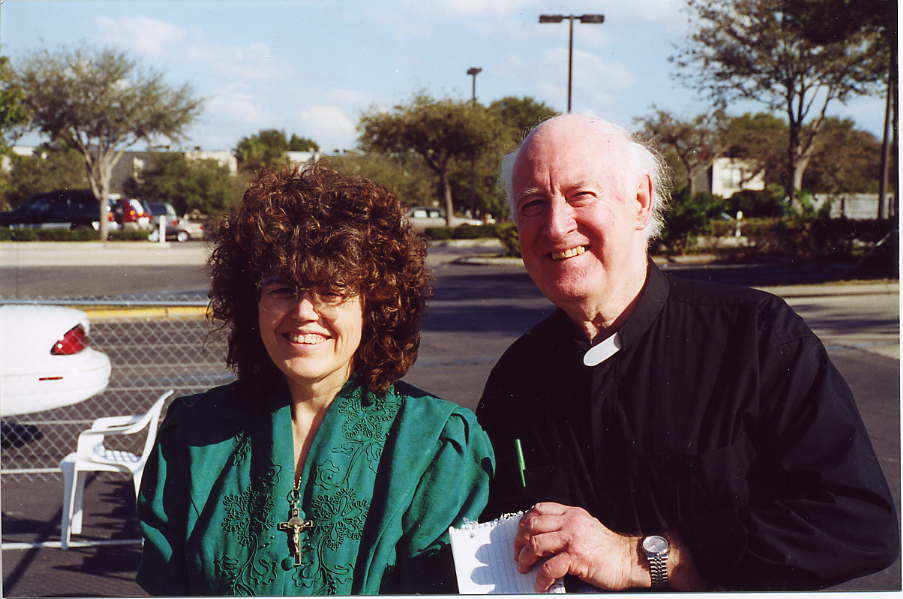
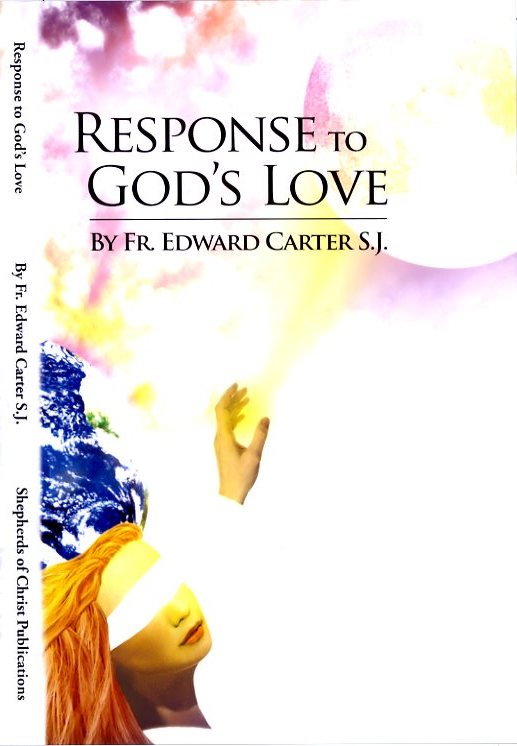
Fr. Carter said the
Blue Books were as much
his as mine
 Blue Book I |
 Blue Book II |
 Blue Book III |
 Blue Book IV |
 Blue Book V |
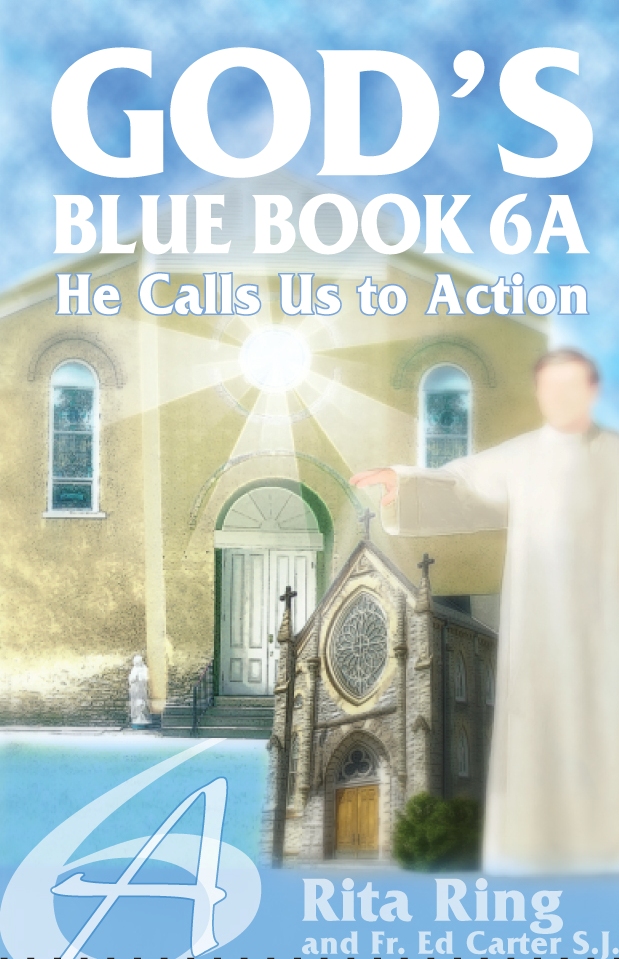 Blue Book VI |
Give a gift that lasts.
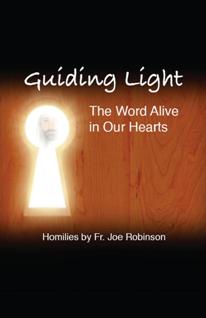
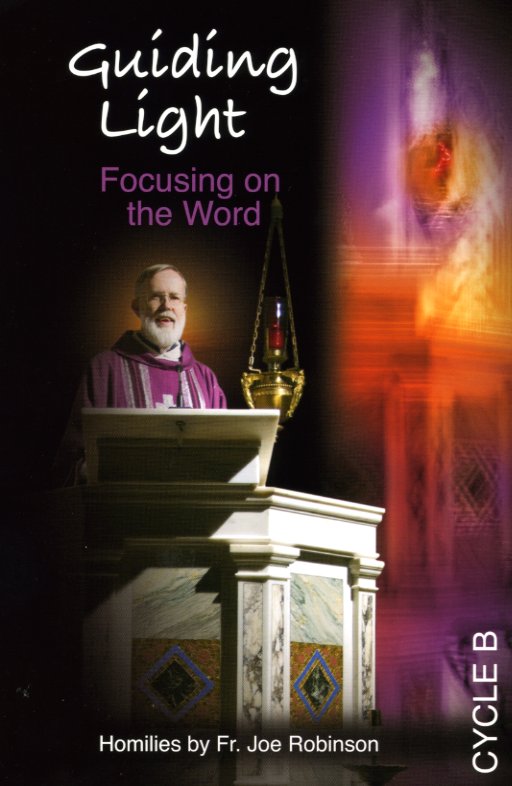



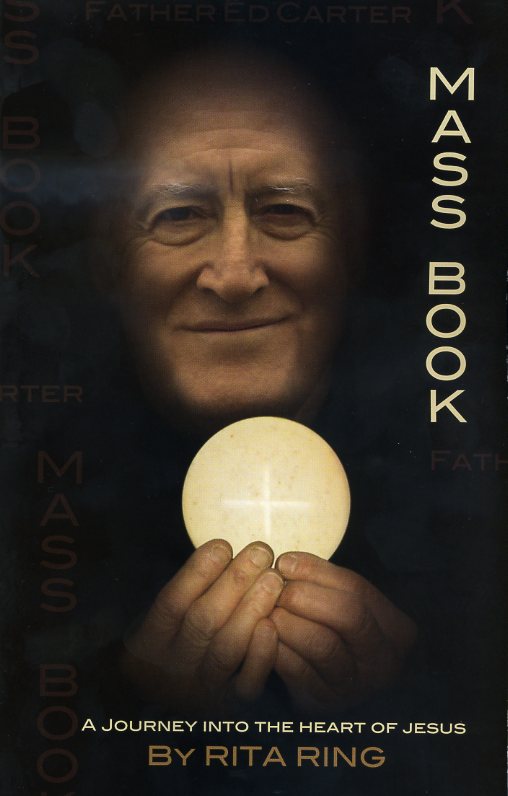
$10.00 each plus shipping
Call 1-888-211-3041
Shepherds of Christ
We can send Fr. Joe's
homily book to a priest for 75¢.
Can you please help us get
these homilies to the priests?
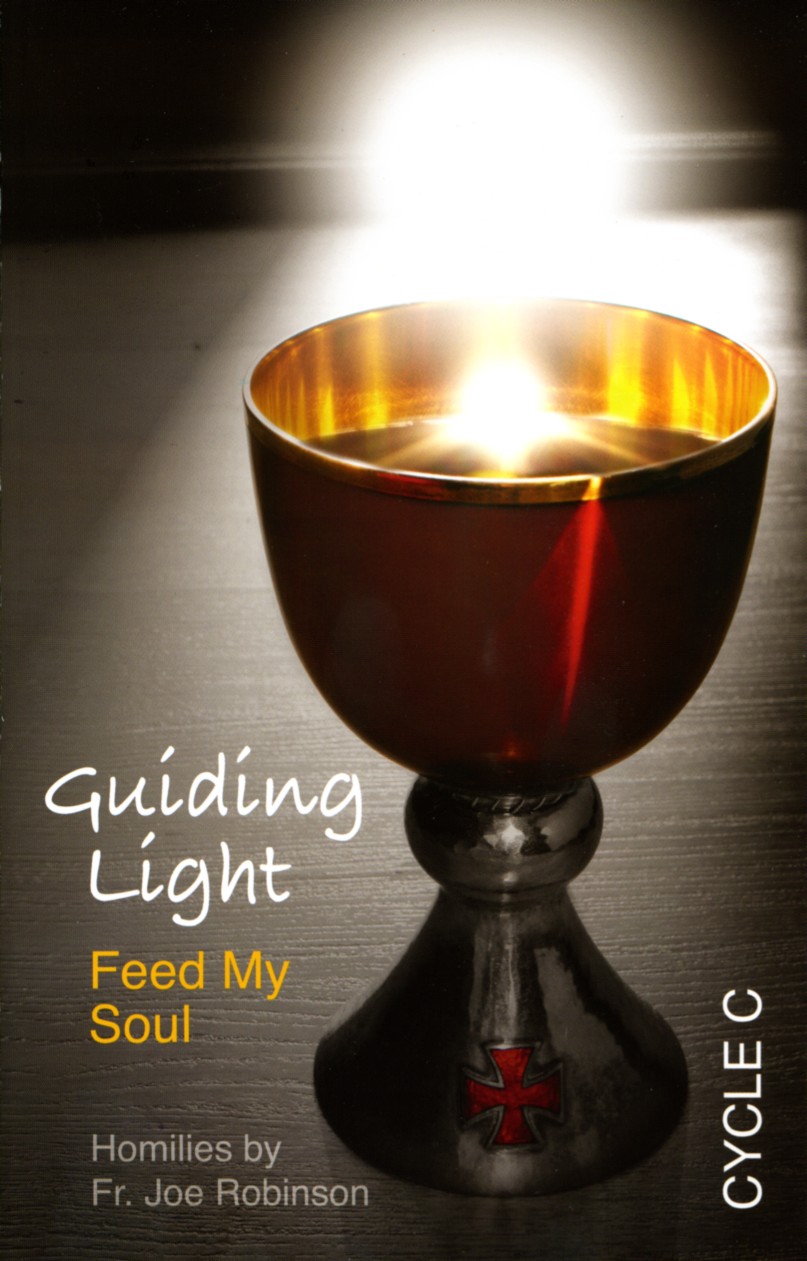
Please help us with your donation.
Call Shepherds of Christ
1-888-211-3041
NEW! — 11" St. Michael - $40.00 plus shipping
Prayer Cards available
Holy Spirit Prayer Act of Consecration to
Immaculate Heart of MaryAct of Consecration to
Sacred Heart of JesusPrayer for Priests
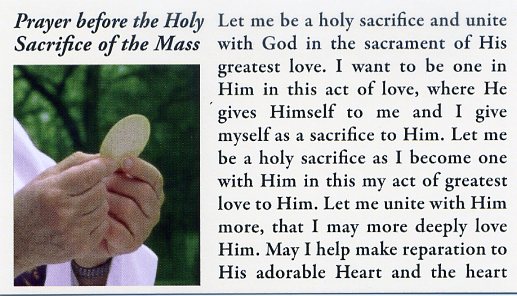 |
| Prayer before the Holy Sacrifice of the Mass |
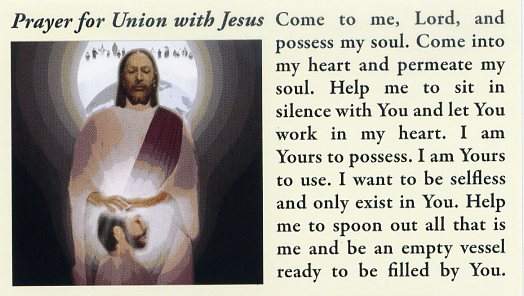 |
|
Prayer for Union with Jesus |
Available for .25¢ each plus postage
Call Shepherds of Christ
1-888-211-3041
Prayer Card 4" x 6"
.50¢ each plus postage





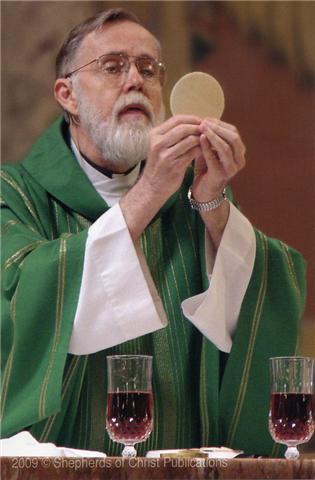
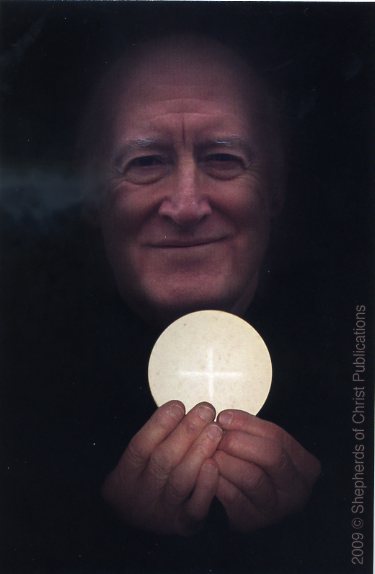
size 5 1/2" x 8 1/2"
$1.00 plus postage

Statues
Sacred Heart of Jesus w/glass - 18
Our Lady-Guadalupe w/glass - 12
Limpias - 8
Immaculate Heart w/glass - 18
I Heart - Ivory w/glass - 18
Our Lady of Grace w/glass - 18
Our Lady-Mt. Carmel w/glass - 18
Our Lady of Lourdes w/glass - 18
Infant of Prague w/glass - 24
Sacred Heart of Jesus w/glass - 24
Sacred Heart -Blessing w/glass - 24
Sorrowful Mother w/glass - 24
I Heart - Ivory w/glass - 24
I Heart of Mary w/glass - 24
Our Lady of Lourdes w/glass - 24

Our Lady-Guadalupe w/glass - 28
Our Lady of Grace w/glass - 24
Our Lady-Mt. Carmel w/glass - 24
Fatima w/glass - 11
Pilgrim Virgin w/glass - 12
Pilgrim Virgin w/glass - 15
Fatima w/glass - 18
Pilgrim Virgin w/glass - 18
Pilgrim Virgin w/glass - 27
St. Padre Pio
St. Joseph
St. Therese
St. Francis
St. Anthony
St. Claire
Limpias
St. Jude

Divine Mercy
Holy Family
Angel
St. Philomena
Pieta - Marble
Pieta - Color
Holy Family

St. Anthony - 18
St. Francis - 18
St. Joseph - 18
St. Therese - 18
St. Rita - 18
St. Clare - 12

St. Rita - 12
St. Padre Pio - 12
Divine Mercy - 12
Shepherds of Christ Ministries
P. O. Box 627
China, IN 47250
Toll free - 1-888-211-3041
Local - 1-812-273-8405
fax - 1-812-273-3182
web: www.sofc.org
e-mail: info@sofc.org
Size Price Quantity Holy Family
24"
$180
Limpias
24"
$125
St. Anthony
24"
$125
St. Claire
24"
$125
St. Francis
24"
$125
St. Joseph
24"
$125
St. Jude
24"
$125
St. Padre Pio
24"
$125
St. Therese
24"
$125
Divine Mercy 22"
$125 Angel 22"
$100 St. Philomena 20"
$100 St. Philomena 16"
$65 St. Joseph 18"
$65 St. Francis 18"
$65 St. Anthony 18"
$65 St. Rita 18"
$65 St. Therese 18"
$65 Pieta - Color 15" $75 Pieta - Marble 15" $75 Holy Family 12"
$60 St. Padre Pio - standing 12"
$40 St. Padre Pio - sitting 8"
$50 St. Rita 12"
$40 Divine Mercy
12"
$40 St. Claire 12"
$40 Limpias 8"
$25 Our Lady of Guadalupe w/glass 28"
$500 Our Lady of Mt. Carmel w/glass 24"
$500 Immaculate Heart of Mary w/glass
24"
$500 Immaculate Heart - Ivory w/glass
24"
$500 Infant of Prague w/glass
24"
$500 Our Lady of Grace w/glass
24"
$500 Our Lady of Lourdes w/glass
24"
$500 Sacred Heart of Jesus w/glass 24"
$500 Sacred Heart -Blessing w/glass 24"
$500 Sorrowful Mother w/glass
24"
$500 Immaculate Heart of Mary w/glass 18"
$300 Immaculate Heart - Ivory w/glass 18"
$300 Sacred Heart of Jesus w/glass 18"
$300 Our Lady of Lourdes w/glass 18"
$300 Our Lady of Grace w/glass 18"
$300 Our Lady of Mt. Carmel w/glass
18" $300 Our Lady of Guadalupe w/glass 12"
$200 Fatima w/glass
11"
$150 Fatima w/glass
18"
$250 Pilgrim Virgin w/glass 12"
$160 Pilgrim Virgin w/glass 15" $200 Pilgrim Virgin w/glass 18" $250 Pilgrim Virgin w/glass 27"
$450
Call for Shipping Price (1-888-211-3041)
Name
Sub-Total Address
IN Tax (7%) City
Shipping State Zip
Donation Telephone
Order Total
Shepherds of Christ
P. O. Box 627
China, IN 47250
Call Shepherds of Christ
1-888-211-3041
Fr. Joe's Homily Books
Guiding Light - Cycle A
The Word Alive in Our Hearts$10.00
Guiding Light - Cycle B
Focusing on the Word$10.00
Guiding Light - Cycle C
Feed My Soul$10.00
Fr. Carter's Books
Priestly Newsletter Book I
12 Newsletters
July 1994 - June 1996$12.00
Priestly Newsletter Book 2
17 Newsletters
1996 - 1999$12.00
Priestly Newsletter Book 3
4 Newsletters & Prayers
2000$12.00
Response to God's Love
$10.00
Messages given
by Jesus and Mary 1994
Tell My People
$10.00
The Pain and the Joy
$10.00
Synopsis of the Spiritual Life
Spirituality Handbook
$3.00
Priestly Newsletter on CD
2000 - Issue 1
$10.00
Priestly Newsletter on CD
2000 - Issue 2
$10.00
Fr. Pasquini's Books
Authenticity
Prayers and Meditations
$10.00In Imitation of Two Hearts
For those suffering or
in Nursing Homes
$10.00Light, Happiness and Peace
Journeying through traditional
Catholic Spirituality$10.00
Medicine of Immortality
Prayers and Meditations - will assist the reader in growth toward a deeper understanding of the mystery of the Eucharist
$10.00
Ecce Fides - Pillar of Truth
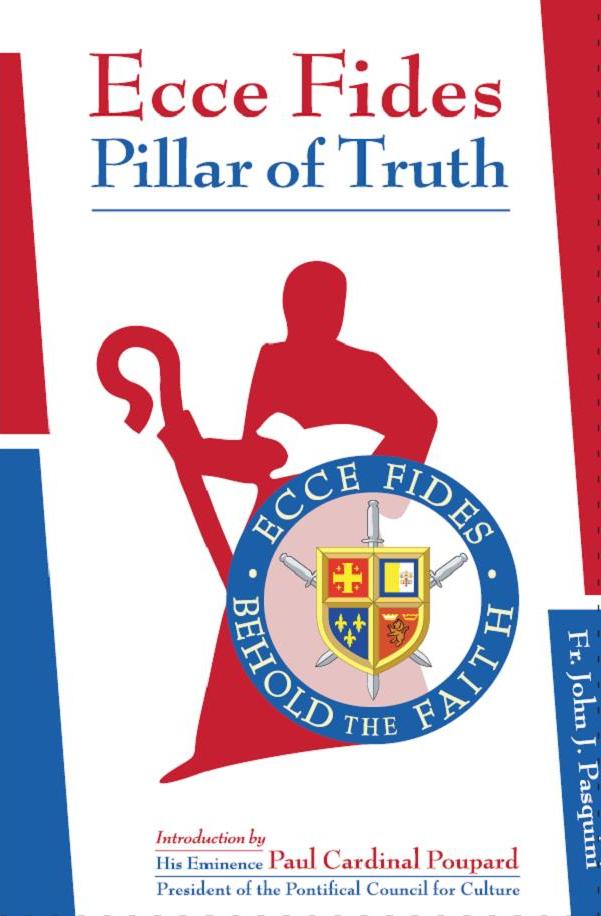
Ideal for RCIA, Adult & Youth Bible Study, Homeschooling, Catholic
Identity Studies$10.00
Shepherds of Christ Newsletters
9 Newsletters
2006 - 2008
$36.00
DVDs and CDs by Fr. Pasquini
Authenticity DVD
Prayers on the Ocean$10.00
Nursing Home Mass DVD
$10.00
Consolation DVD
$10.00
Medicine of Immortality
Read by Rita Ring2 CDs - $17.00
In Imitation of Two Hearts DVD
$10.00
Consolation CD
by Fr. John$8.00
Nursing Home Mass CD
$8.00
Holy Spirit Novena DVD
$10.00
Divine Mercy Chaplet DVD
$10.00
plus shipping
Call Shepherds of Christ
1-888-211-3041
Available for $10.00 plus postage
1-888-211-3041
Call Shepherds of Christ
God’s Blue Books
God’s Blue Book 1 –
Teachings to Lift You Up$10.00
God’s Blue Book 4 –
The Love of the Hearts of
Jesus and Mary$5.00
God’s Blue Book 2 –
The Fire of His Love$10.00
God’s Blue Book 5 –
So Deep Is the Love of His Heart$5.00
God’s Blue Book 3 –
Love God, Love One Another
(Fr. Carter's favorite)
$10.00
God’s Blue Book 6 –
He Calls Us to Action$10.00
Rosary Books
We are trying to get
Response to God's Love
and the Mass Book out.
Anybody who wants to help us
with a donation to get these 2 books
out in the Priestly/hierarchy mailing —
Please call Shepherds of Christ
1-888-211-3041
July 31, 1994
Words of Jesus to Members of
Shepherds of Christ Associates:"My beloved priest-companion, I intend to use the priestly newsletter, Shepherds of Christ, and the movement, Shepherds of Christ Associates, in a powerful way for the renewal of My Church and the world.
"I will use the newsletter and the chapters of Shepherds of Christ Associates as a powerful instrument for spreading devotion to My Heart and My Mother's Heart.
"I am calling many to become members of Shepherds of Christ Associates. To all of them I will give great blessings. I will use them as instruments to help bring about the triumph of the Immaculate Heart and the reign of My Sacred Heart. I will give great graces to the members of Shepherds of Christ Associates. I will call them to be deeply united to My Heart and to Mary's Heart as I lead them ever closer to My Father in the Holy Spirit."
- Message from Jesus to Father Edward J. Carter, S.J., Founder, as given on July 31, 1994,
feast of Saint Ignatius Loyola, Founder of the Society of Jesus (The Jesuits)
The China Church is over 140 years old
and we pray in there 24 hours a day.
It needs stucco and so does
the community building.
Can you please help us?
Call Shepherds of Christ
1-888-211-3041
Likewise the priest house
is 150 years old.
Jesus told us to repair it
which we have been doing.
We need $13,000.00 for this work.
You can help put the Blue Book V
in the hands of 1,000 people
we need $1,200 postage for this
It is ready to go
Call Shepherds of Christ
1-888-211-3041
Crucifix — hand carved by Felix
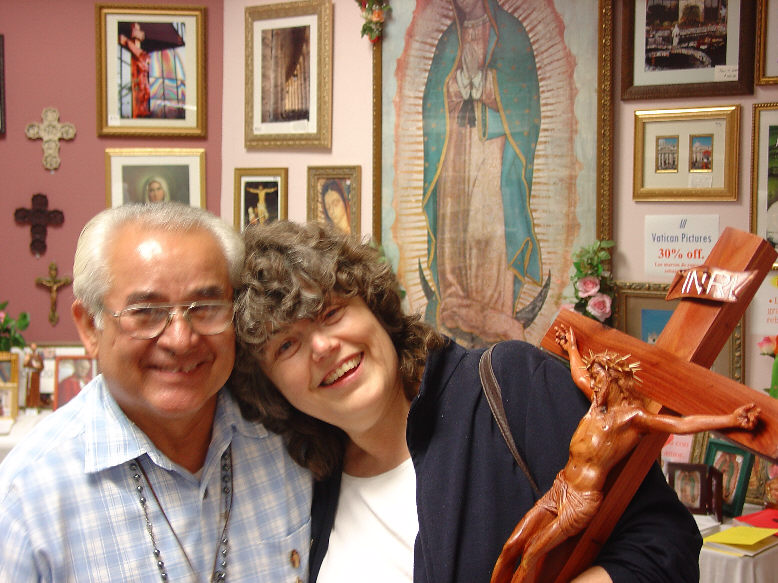
Available for $750.00
Brand New Internet Store